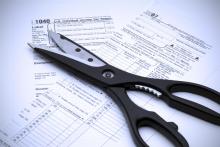
Bankruptcy may discharge tax liability, but a discharge of taxes is a complicated and technical process. First off, only income tax debt can be discharged, it does not work on sales taxes or employee withholding taxes.
The best way to be sure that your taxes will be discharged in a bankruptcy is to talk with an attorney who will check into the circumstances surrounding your tax debts.
WHEN DO TAXES GET DISCHARGED?
In order for income taxes to be discharged in bankruptcy, you must meet several requirements.
Most of these requirements are related to how long it has been since the taxes were due, and how long from when the return was filed.
You must satisfy each one of the 5 rules for your taxes to be dischargeable.
I have listed the 5 rules below:
1. THE 3-YEAR RULE
Income taxes are not dischargeable until at least 3 years* have passed since the tax return was last due.
For example:
- 2016 tax returns were due on April 15, 2017
- 3 years from April 15, 2017 is April 15, 2020
So 2016 income taxes can first become dischargeable on April 15, 2020.
This is a long wait, but if you owe taxes from several years ago, then a bankruptcy might be the best way to handle them.*
2. THE 2-YEAR RULE
The tax return must have been actually filed at least 2 years* before the filing of the bankruptcy case, and this rule is more complicated than it sounds. This is because it includes any extension to file the tax return as well as can include amendments made to your tax returns.
3. THE 240-DAY RULE
The tax amount must also be assessed at least 240 days* before the filing of the bankruptcy petition.
What is an assessment?
For the IRS, at least, assessment happens when the amount is notated in the Secretary of the Treasury’s records.
For state taxes, it happens when the tax liability is final. This does not happen immediately when you file the tax return in question.
It usually, however, happens before the 2-year or 3-year rule has finished.
The 240-day rule can be a problem for assessments of certain new taxes or penalties.
4. THE NON-FRAUDULENT RETURN RULE
This rule explains itself better than the others.
If you prepared the return fraudulently, then the taxes from that year are not dischargeable in bankruptcy.
The question of what is a badly prepared tax return and what is a fraudulently prepared tax return depends on very specific facts, and is beyond the scope of this article.
5. THE NO-WILLFUL-ATTEMPT-TO-EVADE RULE
This rule says that a tax debt is not dischargeable if the taxpayer made a willful attempt to evade paying the taxes.
Courts have been all over the place on what they decide is a willful attempt to evade.
- Some courts have found that depositing one’s paycheck in a girlfriend’s account so that the IRS couldn’t levy it was a willful attempt to evade
- Others have found that failing to report over $200,000 of income in an offshore account was not
Like rule number 4, this article cannot completely explain the subject which is why it is best to talk with an experienced bankruptcy attorney.
*There are events that can pause these time periods. For example, the clock on the 3-year rule stops for every day that you are in an active Chapter 13 bankruptcy. There are several other such rules, which make taxes in bankruptcy a very complicated subject.
WHAT HAPPENS IF THE TAXES DON’T GET DISCHARGED?
If your taxes are not dischargeable in bankruptcy, then it is best to work out a payment plan with the IRS.
The IRS has very detailed financial rules for what they require as a payment, but the final payment is usually affordable.
You could:
- Try an offer in compromise which is another tax resolution procedure where you pay the IRS what you can afford, and they forgive the rest
- Decide to simply wait until you do qualify to discharge the taxes in bankruptcy
- File a Chapter 13 Bankruptcy and use the monthly payments to pay off any nondischargeable tax debts over 5 years, and your other debts will be discharged at the same time
Chapter 13 Bankruptcy is useful because the bankruptcy protects you from any act to collect a debt for the 5 years while you make the payments. It even protects you against acts from the IRS or state taxing authority to collect debts.